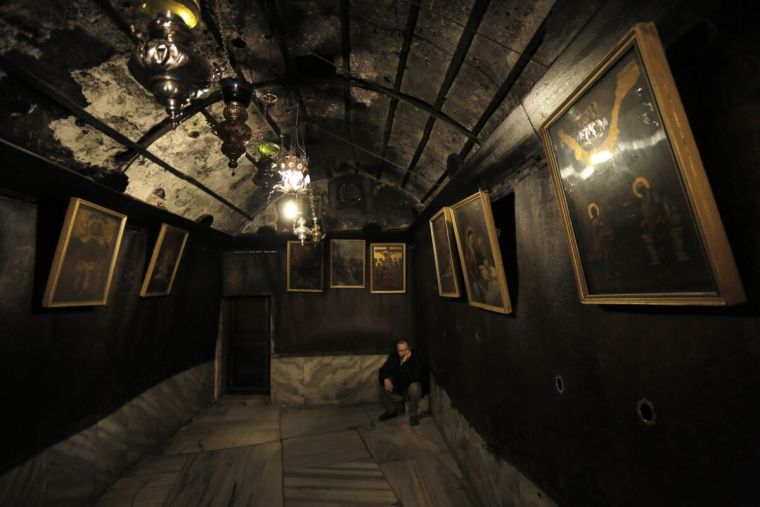Epiphany: Five things we can learn from the Journey of the Magi

Today is Epiphany, when Western churches of a liturgical persuasion remember the coming of the Wise Men to see Jesus. As it happens, it's also just two days after the 50th anniversary of the death of the poet TS Eliot.
One of his most famous poems is The Journey of the Magi. It begins:
"A cold coming we had of it,
Just the worst time of the year
For a journey, and such a long journey:
The ways deep and the weather sharp,
The very dead of winter."
Eliot was quoting a sermon by Bishop Lancelot Andrewes preached before King James on Christmas Day, 1622. It's not a quick or easy read – Andrewes loved words and enjoyed puns, and sprinkled his sermons with plenty of Latin – but here are five thoughts from the sermon worth pondering.
1. Andrewes says that their faith meant the Magi took it for granted that Christ was born; they just wanted to know where.
"St Luke calleth faith the 'door of faith'. At this door let us enter...They never ask an sit, but ubi sit? Not 'whether' but 'where He is born'. They that ask ubi Qui natus? take natus for granted, presuppose that born He is. Herein is faith – faith of Christ's being born, the third article of the Christian Creed."
We can have all sorts of questions about the Christian faith, and that's fine. When we stop asking questions we stop learning. But we start with the knowledge that "Christ is born": that the Word became flesh and God came to earth. When we believe that, we're starting all our questions from a belief in God's goodness to us.
2. Andrewes acknowledges that we no longer have a star to follow. Instead we have God's word in Scripture.
"The star is past and gone, long since. 'Heaven and earth shall pass, but this word shall not pass.' Here on this, we to fix our eye and to ground our faith. Having this, though we neither hear Angel nor see star, we may by the grace of God do full well."
It would be nice if we had a star to follow, or the pillars of cloud and fire that led the Israelites through the wilderness. Most of us at some point feel confused about right and wrong, or about what to think or believe. But patient and humble reading of Scripture helps us on our way.
3. He says that for a complete 'seeing', the Magi have to see the star with their eyes and understand the prophecies in Scripture. But there's more.
"Besides these there must be a light within the eye; else, we know, for all them nothing will be seen. And that must come from Him, and the enlightening of His Spirit...The light of the star in their eyes, 'the word of prophecy' in their ears, the beam of His Spirit in their hearts; these three made up a full vidimus ['We have seen']."
In John 14:26 Jesus says: "But the Helper, the Holy Spirit, whom the Father will send in my name, he will teach you all things and bring to your remembrance all that I have said to you." Without the Spirit within us, faith is just an intellectual exercise.
4. Andrewes says that we can learn from their faithfulness to their vision – the Magi expected to find the baby in a palace, but when they found him in a stable they worshipped him anyway.
"For full little know they, where and in what case they shall find Him. What, if in a stable, laid there in a manger, and the rest suitable to it; in as poor and pitiful a plight as ever was any, more like to be abhorred than adored of such persons?... Will they not step back at the sight, repent themselves of their journey, and wish themselves at home again? But so find Him, and so finding Him, worship Him for all that? If they will, verily then great is their faith."
Jesus isn't always where we expect him to be. But if we're faithful to our vision, we'll be willing to have our preconceptions shattered by what God does.
5. Andrewes takes inspiration from the commitment of the Magi to the journey, with all its hardships and dangers.
"And we, what should we have done? Sure these men of the East will rise in judgment against the men of the West, that is with us, and their faith against ours in this point... Our fashion is to see and see again before we stir a foot, specially if it be to the worship of Christ. Come such a journey at such a time? No; but fairly have put it off to the spring of the year, till the days longer, and the ways fairer, and the weather warmer, till better travelling to Christ."
In an age where it's harder and harder to get believers off their sofas and into church, this hardly needs comment. How much will we inconvenience ourselves for Christ?
Follow @RevMarkWoods on Twitter.











